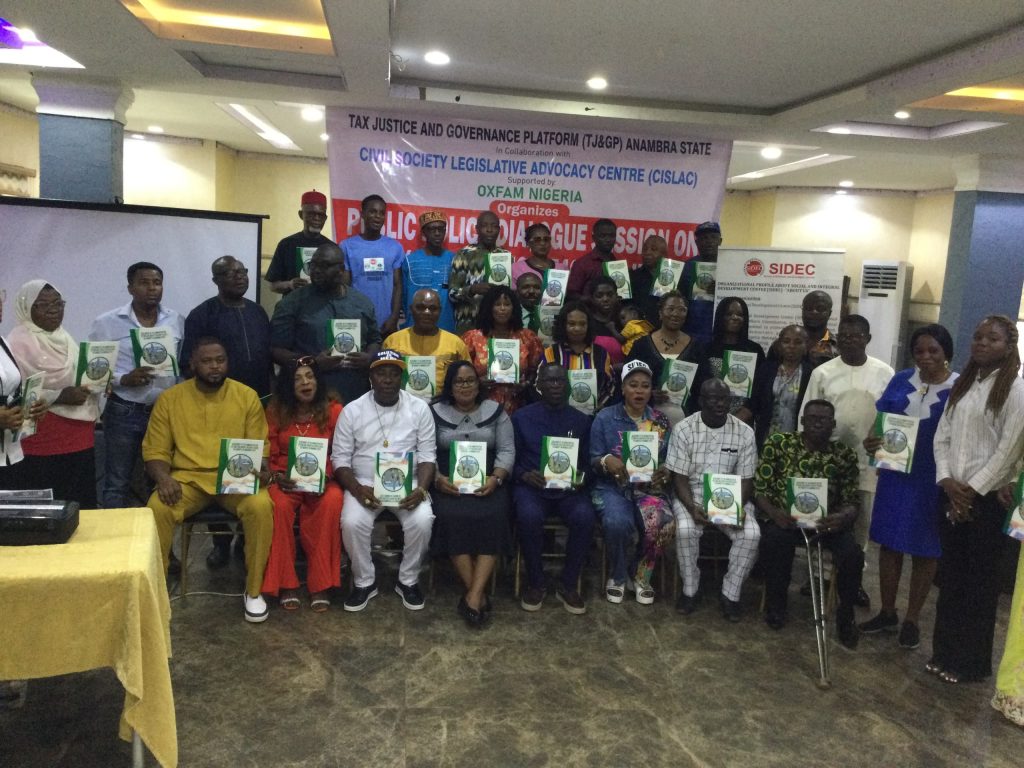Lawrence Nwimo, Awka
Stakeholders in Anambra State have commended the Social and Integral Development Centre (SIDEC) for its efforts in bridging the governance gap in the state.
During a Public Policy Dialogue Session on Tax for Service (T4S) in Awka, the state capital, stakeholders comprising market leaders, government actors and activists said SIDEC’s interventions have led to increased transparency, accountability, and efficiency in tax collection.
The dialogue hosted by TJ&GP in partnership with the Civil Society Legislative Advocacy Center (CISLAC) was aimed at fostering collaboration among stakeholders to share experiences, exchange ideas, and sustain the gains of the tax-for-service intervention in the State.
Sharing his experience, Commissioner for Commerce and Industry, Christian Udechukwu, represented by Mazi Chuka Okeke, highlighted that the longstanding challenge in governance had been the disconnect between the government and its people, but noted that SIDEC has successfully bridged the gap.
“Taxation is not just about tax but about reaching the people with the tax. Government is not just about what you are giving to the people but giving them what they desire. With what SIDEC is doing it is possible for Anambra to apply the tax funds to the needs of the people,” he added.
Executive Director of SIDEC, Ugochi Ehiahruike, during her opening remarks, said the tax intervention has been a game changer that had enhanced the state’s revenue generation.
The SIDEC boss, during her presentation on “System Change,” underscored the importance of building Anambra taxation system on the principles of transparency and robust accountability mechanisms, stating that a balance between fairness and equity will ensure the system is just and sustainable for all stakeholders.
She advocated for a more coordinated approach to taxation to enhance efficiency and transparency in revenue generation. She also noted that if the approach is achieved, it would effectively tackle the long-standing issue of weak coordination that had plagued the state’s taxation system.
Highlighting the gains of the intervention, she stated that Onitsha Main market has generated an improved tax revenue, which she said had reflected in government’s installation of solar light, fire equipment and trucks, a primary healthcare centre and construction of link roads within the market.
On his own, Executive Director, Assessment, Anambra State Internal Revenue Service, AiRS, said Anambra State is fortunate to have a governor, who is determined to manage the state resources without borrowing.
“Everybody can see what we are doing. Every part of Anambra has experienced an explosion in terms of infrastructure development in the state and all are tied to taxes. Last year, Anambra ranked about 13th in terms of internal revenue. But we believe that by the end of this year, Anambra will be among the top five in Nigeria,” he said.
Chief Evaristus Uba, Special Adviser to the Governor on trade and markets, expressed gratitude to SIDEC for raising awareness among traders on the importance of tax payment. He said the initiative enables traders to contribute meaningfully to the government’s revenue, which in turn provides them with necessary amenities as outlined in their charters of demands.
Uba, represented by Director of Markets, Frank Iloduba, encouraged market leaders to generate charter of demands for government interventions that cater for their needs. He reminded them that the government is ever ready to sustain existing collaboration for the good of markets and the state.
Chairman of Onitsha Main Market Association, Chief Innocent Ezeoha, revealed a significant shift in the market’s attitude towards taxation.
“Previously, the market didn’t believe in paying taxes, but this changed when the government demonstrated its commitment to working effectively with tax monies.”
Ikechukwu Ofokansi, National Vice President of the Association of Anambra Town Union, expressed gratitude to SIDEC for its pivotal role in bridging the gap between the government and taxpayers. He emphasised that ASATU remains committed to encouraging the people of Anambra to pay their taxes for the government to fulfill its duties.
Chairman Joint National Association of Persons with Disabilities, JONAPWD, Anambra State Chapter, Comrade Ugochukwu Okeke, lauded the enhanced accountability and transparency in government spending, noting that the intervention has improved PWDs access to markets in the state.
Presenting the baseline study of taxation in the state, a tax consultant, David Agu, reported that a significant number of traders in the state lacked proper awareness of the provisions of the state’s tax law.
He said the findings underscored the importance of effective communication in driving tax compliance, calling on the tax agency to add to the way SIDEC had done for greater voluntary payment of tax in the state.
In his presentation on Tax Reform, Mr Ayo Omowu, Programme Manager, of CISLAC, encouraged stakeholders to support the drive for passage of tax reform bill to address critical challenges in revenue generation, equity, and governance, noting that it is a vital step for sustainable development and economic stability.

